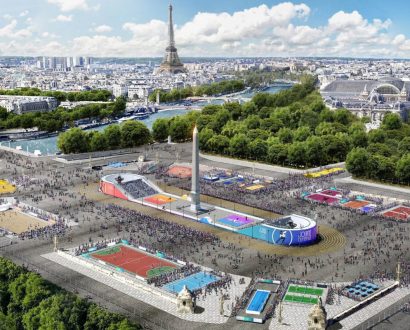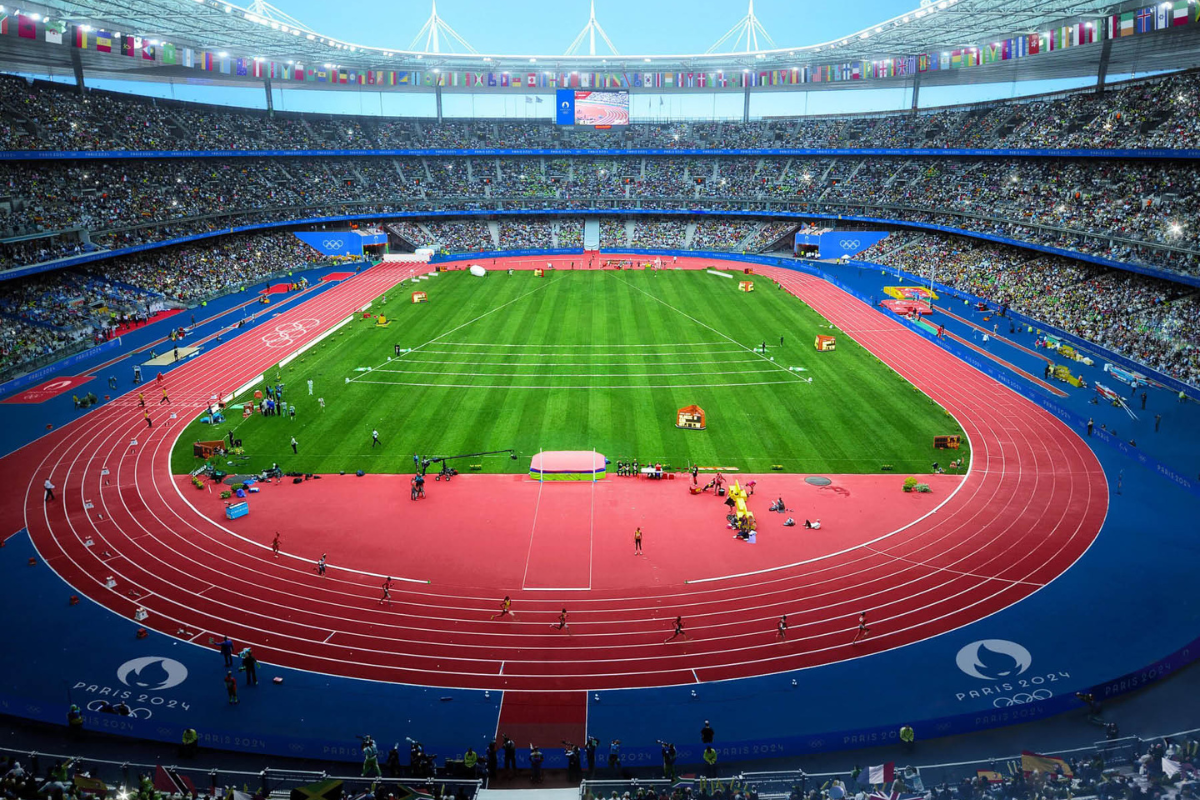Paris 2024 Olympic organizers are going for social and environmental gold

Exactly a century ago, when Paris last hosted the Summer Olympics, 44 countries participated, including Ecuador, Ireland, Lithuania, Philippines and Uruguay, who were making their games debut alongside sports such as women’s foil fencing.
The games concluded for the first time ever with a Closing Ceremony, and among the breakout stars was the United States’ Johnny Weissmuller, who would go from his gold medal performances in the swimming pool to Hollywood and the title role in 12 Tarzan movies.
The social and environmental legacy of this year’s Olympic Games are front and center.
Fast forward to 2024, and this time around the French capital is set to welcome participants from more than 200 countries, including the Refugee Olympic Team. They will battle it out for gold, silver and bronze on sporting fields powered by renewable energy, and refuel in the athletes’ village on plant-based meals imagined by Michelin-starred chefs and made with local ingredients.
In the intervening years, not only have sports like surfing, skateboarding, sport climbing (2020) and breakdancing (2024) risen to Olympic level, but words like sustainability, climate change and social equality have been added to our everyday vocabulary.
The social and environmental legacy of this year’s Olympic Games are front and center of the Paris 2024 Organising Committee’s consciousness. Here is how this year’s Olympiad is going for good – as well as for gold.
Climate-Proactive

It’s the great Olympic paradox: in turbulent times, sport serves more than ever as a unifier. At the same time, does the planet really need 10,000 participants, plus countless spectators and media, to fly into Paris from all over the world? Writing on the Olympics.com website, HSH the Sovereign Prince Albert II of Monaco (a five-time Olympian) acknowledges that while there are "currently no solutions to fully eliminate the carbon footprint of large events, Paris 2024 is showing how this can be reduced".
Both the Olympics and Paralympics will harness wind and solar power as it pledges to run on 100 percent renewable energy.
The organizers claim they are on track to slash carbon emissions by half, as compared to the averages of both London 2012 and Rio 2016. Both the Olympics and Paralympics will harness wind and solar power as it pledges to run on 100 percent renewable energy. By turning to alternative sources rather than diesel generators, these games are set to save the equivalent of 13,000 metric tons of carbon emissions.
Lower-Impact
It’s an unavoidable reality that if you want to host the Olympic Games, it’s going to cost you. Russia’s bill for the 2014 Winter Olympics in Sochi came in at a whopping US$50 billion, according to the Council on Foreign Relations. Much of that expenditure was to build the required infrastructure to host the event.
While the final costs are yet to be tallied for Paris, the budget is around US$8.5 billion – and hopes are high that limiting new constructions will stop costs from spiraling. Around 95 percent of venues will be temporary structures or existing buildings that will be refurbished and modernized. After the Olympic flame has been extinguished, these renovations will contribute to urban renewal in the city.
Food for Thought
To feed an Olympics, 13 million meals are needed – that’s what Paris 2024’s organizers are projecting in any case. And, in a country that takes food very seriously, there’s a huge appetite for approaching Olympic cuisine through a sustainable lens. That means doubling the amount of plant-based food, prioritizing local and organic sourcing (80 percent of ingredients will be French and 30 percent of ingredients organic), halving the amount of single-use plastic, limiting food waste and selling unused food at reduced prices or gifting it to local organizations.
Some of the country’s most celebrated chefs, including Alexandre Mazzia from three-Michelin-starred restaurant AM in Marseille, are consulting on a menu of more than 500 dishes – with at least one recipe to represent each region of France.
Equal Opportunity
Olympic organizers have openly stated that employment is a "priority area" for Paris 2024, with the games set to create 150,000 jobs across areas such as event organization, tourism, catering and construction. While that’s nothing new – Tokyo’s winning bid generated the same number of employment opportunities – the French are funneling many of these opportunities towards the long-term unemployed, the country’s small and medium businesses and disadvantaged communities.
Paris has chosen its emblematic Seine waterway as the unconventional setting for the Opening Ceremony.
In a first for the Olympics, Paris 2024 agreed on a social charter with trade unions and employer organizations. In it, plans were laid out to ensure at least 10 percent of procurement working hours are filled by people considered "far from employment" – those not employed, nor in education or training. Other strategies include the preparation of French high school students for employment opportunities through work experience and training schemes.
The Paris 2024 procurement strategy is not only about bringing the long-term unemployed back into the workforce but also about promoting the country’s small to medium-sized enterprises (SMEs) as well. Of the 90 percent of supply contracts awarded to French businesses, nearly three-quarters of them – or 1,200 businesses – are SMEs.
Regenerative Powers
Rather than in a stadium, Paris has chosen its emblematic Seine waterway as the unconventional setting for the Opening Ceremony. Expect to watch the athletes paraded down the iconic river on boats. Initially, eyes will be far from the Stade de France, which will also serve as the Olympic Stadium. But the French administrative department where the stadium is located, Seine-Saint-Denis, is set to benefit in the long run from Olympic regeneration.
Among the positive impacts for the area, which suffers from some of the highest unemployment and poverty rates in France, are new sports facilities, including a new aquatic center (the only new purpose-built competition venue), cycling lanes and green spaces. And, once the participants have left the Olympic Village, the site will be converted into a much-needed new residential neighborhood in the suburb of Saint-Denis with nearly 3,000 apartments, shops and green areas.
Making Waves
A French overseas territory, Tahiti is the unlikely site for the surfing competition at the Paris 2024 Olympic Games. But here, nearly 16,000 kilometers from the French capital, the Organising Committee is facing criticism for an act that flies in the face of stated sustainable aims.
In order to host the event, organizers are hoping to construct an aluminum tower in the water for judges and cameras. The problem is that, by doing so, foundations will have to be drilled into a coral reef. Opponents are asking why the existing wooden judges’ structure, which has stood for two decades, isn’t enough?